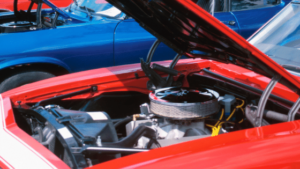
Automotive aluminum has been around since aluminum was first produced. At the time, it was prohibitively expensive to use as an auto material en masse. But as aluminum became more affordable, and more and more aluminum alloys have been engineered to meet the specific needs of the automotive industry, it has become today’s fastest growing automotive manufacturing material.
The range of applications for aluminum in cars evidences the beautiful versatility of the material. It’s being used for doors, hoods, trunks, electrical wiring, transmissions, air conditioner condensers and tubes, engine parts including pistons, radiators, and cylinders, display paneling, crossmembers, brake systems, and the list goes on!
Kloeckner Metals is a full-line aluminum supplier and service center. Download our aluminum spec sheet to see what we routinely stock.
Aside from the basic properties of aluminum that make such widespread application possible, there are two key advantages of aluminum causing modern car makers to prefer it. The first is that it improves fuel economy, which is an easy sell for consumers who’ll save money by spending less on gas. And the second reason is that choosing aluminum for auto manufacturing can reduce CO2 emissions because of its lower weight.
But, that’s not all. Drive Aluminum outlines 6 reasons to explain why aluminum is one of the fastest growing automotive materials today:
Individually, any one of these key benefits would make a great case for material use in autos. Taken altogether, they present a 3-pronged explanation for why aluminum has become today’s fastest growing automotive material—it’s great for consumers, valuable to automakers, and also satisfies federal regulations in an age of heightened sustainability concerns.
Let’s dive into each of those benefits a little deeper.
When purchasing a vehicle, safety is no doubt a top priority. Annual motor vehicle fatalities in the U.S. hover around 35,000, amounting to over 3.5 million since the late 19th century. In response, the National Highway Traffic Safety Administration (NHTSA) has improved upon and tightened safety guidelines, and fatalities are on the decline. We can’t attribute the decline in fatalities to aluminum alone, but having a consistently high crash test rating is encouraging. It builds confidence and saves lives.
In the event 5-star crash test ratings are not enough to prove the durability of the material, learning that aluminum has become a gold standard for military and defense vehicles might sooth any safety concerns. It’s good to know that the car you drive is armor-tough. For example, many of the 5xxx series aluminum grades make their way into both consumer and military vehicles.
Not unlike safety concerns, sustainability is important to consumers, automakers, and regulators alike. Understandably so, as having a smaller carbon footprint affects everyone. While producing primary aluminum can require a significant amount of energy, aluminum is a recyclable material. Nearly 75% of all of the aluminum ever produced is still in use today.
It’s sustainable beyond that. Because aluminum has an excellent strength-to-weight ratio it is a light material that maintains quality strength. For automakers, this translates to less material needed for equal efficiency measures.
When performance standards can be met with aluminum, the resulting vehicle is lighter. A lighter vehicle means less work on the engine, and less fuel required.
This creates a high-value sweet spot, which greenlights aluminum as a preferred material.
Since carmakers strive to produce lighter, safer, more fuel-efficient vehicles, technology improvements have advanced the performance benefits of aluminum in cars while proving better suited in certain cases to meet new challenges than steel. While dual-phase sheet steels and other AHSS steels specifically engineered for automotive light-weighting exist and continue to be developed, aluminum offers an immediate solution with maximum weight reduction.
Aluminum has the incredible ability to be alloyed with elements ranging from copper to magnesium to silicon, and each of these particular alloy compositions highlight various performance qualities of aluminum itself. For example, the 5xxx series aluminum grades mentioned above are magnesium-based grades. Magnesium produces a harder and stronger aluminum that demonstrates excellent impact resistance.

While steel is an incredibly tough material, it’s also heavy. It can also endure the impact necessary for vehicles, but it has a high-cost in terms of added weight to the vehicle. The weight of steel—assuming it is not high strength or ultra-high strength steel specifically designed with better strength-to-weight ratios—puts strain on the engine and leads to lower fuel economy and higher emissions. These are all poor outcomes for stakeholders.
Since the auto industry must meet new performance requirements to meet federal and consumer demand, automotive aluminum stands out as a popular and practical choice.
Electric vehicles are made differently than internal combustion powered vehicles. Lithium batteries are heavy, and high range is difficult to achieve. Things like whether the air conditioning or heat is being used will impact how many miles are possible to achieve with an electric vehicle battery before charge is required.
Something is required to offset the weight of batteries, and the variables associated with consumer use. Aluminum is a pragmatic solution. It extends range and offsets battery weight and costs by being a light material. In addition to the increased applicability of aluminum sheet, electrification also increases demand for aluminum extrusions.
6xxx series aluminum, which is magnesium and silicon based, offers the highest quality extrusion capabilities that electrification requires. For automakers extrudability signifies easy workability for custom parts, which distinguish the look and feel of cars that is central to vehicle branding and competitor differentiation. It also helps when the same auto manufacturer can use, say 6016 aluminum sheet for both a compact economy car and a pickup truck or SUV. High-pressure aluminum diecast parts are also common for things like battery housings, motor housings and body structural components.
Each of these common aluminum grades have been purposed in automotive aluminum to meet the unique needs of the auto industry. Through sheer versatility and high-value aluminum continues to satisfy consumers, manufacturers and regulators.
Kloeckner Metals is a full-line aluminum supplier and service center. Kloeckner Metals combines a national footprint with the latest fabrication and processing technologies and most innovative customer service solutions.

Steel base plates are fundamental elements employed in various manufacturing...
Metal fabrication is a critical process that transforms raw metal...
The solar industry has undergone a significant transformation by incorporating...

X
The Kloeckner Metals website uses modern technologies. Unfortunately, your browser doesn't support those technologies.
Download the latest version of one of these browsers to experience the site: